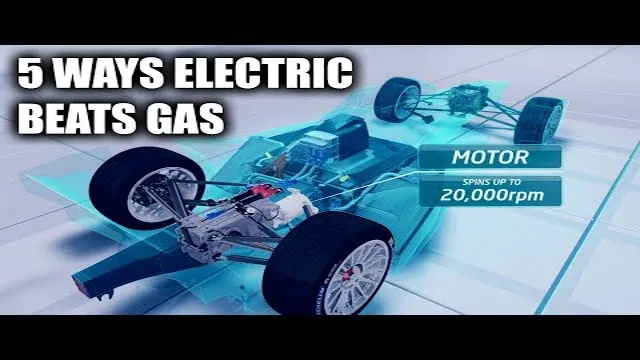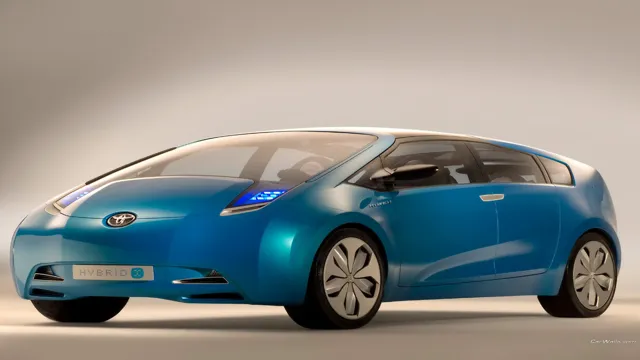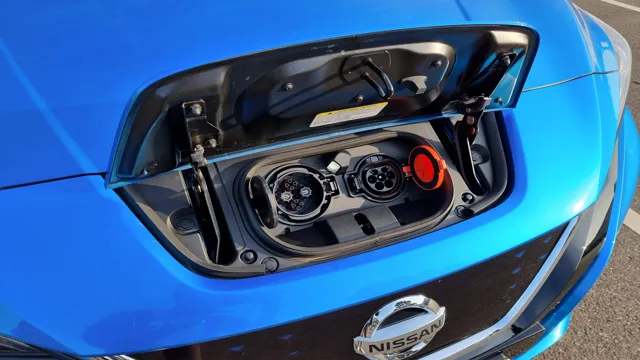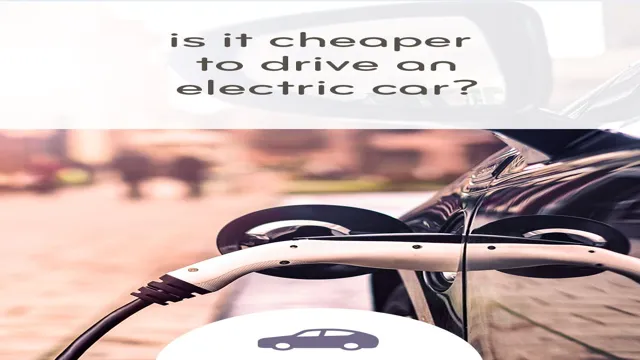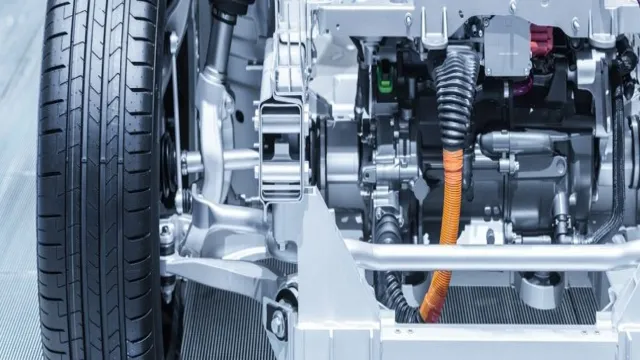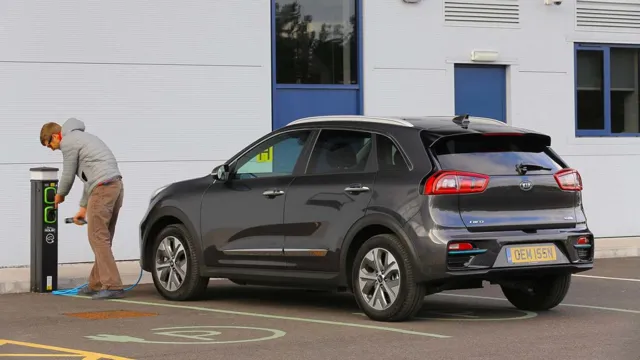Electric Cars: The Cost-Efficient Choice! Here’s Why They’re Cheaper to Maintain
Electric cars have been growing in popularity in recent years, and for a good reason. Not only do they offer an eco-friendly alternative to traditional gas-powered cars, but they also come with significant cost savings in the long run. One of the biggest advantages of electric vehicles is their cheaper maintenance cost.
It may come as a surprise to some, but electric cars not only save money on gas but also on repairs and maintenance. In this blog post, we’ll explore why electric cars are cheaper to maintain and why it is a significant factor to consider when purchasing a car.
Less Complex Parts
One of the biggest advantages of owning an electric car is the significantly lower maintenance cost when compared to traditional gasoline vehicles. One reason for this is that electric cars have less complex parts than their gas-guzzling counterparts. With fewer moving parts and no need for oil changes or fuel system maintenance, electric cars require less time and money spent on routine upkeep.
Another factor that contributes to the lower maintenance costs is regenerative braking. Instead of wearing down brake pads and rotors like in traditional cars, electric vehicles use regenerative braking to capture energy and recharge the battery. This means owners of electric cars will likely spend less on brake replacements in the long run.
Overall, the simplicity of electric car technology allows for lower maintenance costs and greater savings for owners.
Electric motors have fewer moving parts compared to gasoline engines.
Electrical motors have become the go-to choice for many vehicle manufacturers, and there’s a good reason for it. One of the major benefits of electric motors is that they have fewer moving parts than traditional gasoline engines, making them less complex overall. In a gasoline engine, there are hundreds of moving parts: pistons, valves, crankshafts, camshafts, and more.
In contrast, electric motors have only a few key components, such as the rotor, stator, and bearings. This simplicity translates to lower maintenance requirements, fewer parts to replace, and less wear and tear on the motor over time. Fewer moving parts also mean less friction and less heat generated during operation, which improves the efficiency and longevity of the motor.
Additionally, because electric motors don’t have internal combustion, they emit no exhaust gases, making them a cleaner, more environmentally friendly option. Another advantage of fewer moving parts is that electric motors are quieter and smoother than gas engines. There’s no combustion noise or vibration from moving parts, and the absence of a transmission further reduces noise and vibration.
Instead, the torque is delivered almost instantly, giving a seamless, smooth driving experience similar to a high-end luxury car. In conclusion, electric motors represent a significant step forward in vehicle technology, and their simplicity is just one of the many reasons they are superior to traditional gas engines. They offer far lower maintenance and operational costs, greater efficiency and environmental friendliness, and an unmatched driving experience.
People who are looking for a reliable and cost-effective mode of transportation should definitely consider electric vehicles powered by these less complex electrical motors.
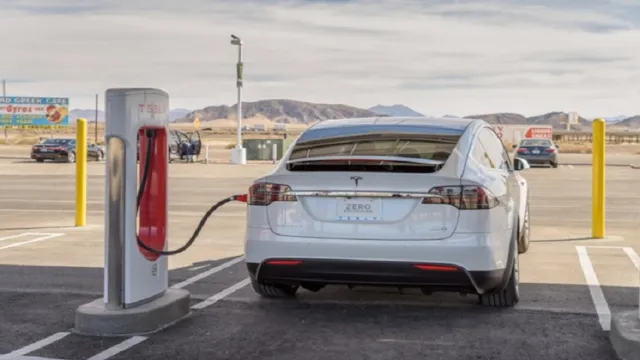
Fewer parts means less maintenance and less wear and tear.
When it comes to machinery and equipment, having fewer parts means less complexity, which ultimately leads to less maintenance and less wear and tear. This is because a simpler design means there are fewer opportunities for things to break or malfunction. With less complexity, the parts that are used are often less specialized and can be more easily replaced or repaired if necessary, reducing the need for expensive and time-consuming maintenance.
Plus, because there are fewer parts to maintain, there is less wear and tear on each individual component, which can help extend the life of the equipment overall. So, whether you’re talking about a car engine, a kitchen appliance, or any other type of machinery or equipment, a less complex design with fewer parts can often be a big advantage in terms of reliability and maintenance. So, the next time you’re in the market for new equipment, it might be worth considering a simpler design to save time and money in the long run.
Lower Maintenance Frequency
Have you ever wondered why electric cars are cheaper to maintain compared to their gas-powered counterparts? Well, it all boils down to the lower maintenance frequency. Electric cars only have a few moving parts compared to traditional cars, which means there are fewer things to break or wear out over time. For instance, electric cars don’t need oil changes, air filter replacements, or coolant flushes, which are all common maintenance tasks for gas cars.
Instead, electric cars require very little maintenance, such as battery inspections, tire rotations, and brake pad replacements. These tasks are less frequent and cost less in the long run, making electric cars more affordable to maintain over time. Moreover, electric cars have regenerative braking systems that prolong brake life and reduce brake dust, which means you’ll spend less time cleaning your rims and more on the road.
Thus, if you’re looking for a car that won’t break the bank in maintenance costs, consider an electric car.
Electric cars require fewer oil changes, tune-ups, and brake replacements.
Electric cars are becoming increasingly popular due to their numerous advantages, one of which is their lower maintenance frequency. With fewer parts to worry about, these vehicles require fewer oil changes, tune-ups, and brake replacements than traditional gas-powered cars. This not only reduces costs but also saves valuable time and effort.
Additionally, electric cars use regenerative braking, which minimizes wear and tear on the brake pads and rotors. As a result, the need for replacement is reduced, leading to further cost savings and convenience. The maintenance for electric cars is straightforward, keeping in mind to keep the battery charged, replace the cabin air filters, and rotate tires.
These advantages make electric cars an excellent alternative to gas-powered vehicles, as they provide a more cost-effective and easier-to-maintain means of transportation. Opting for electric cars is therefore an excellent decision, both for environmental reasons and for practicality.
Battery maintenance is minimal and can last up to 10 years.
When it comes to maintaining batteries, the good news is that it’s not something you’ll constantly need to worry about. In fact, with proper care, batteries can last up to 10 years! This means that battery maintenance is minimal, and you won’t be spending much time or money on upkeep. Of course, every battery is different, so it’s important to read the manual or consult with the manufacturer for specific maintenance instructions.
However, in general, all batteries benefit from occasional checks on the charge and electrolyte levels, as well as keeping them clean and dry. By doing so, you can ensure that your battery remains in good condition and performs efficiently for as long as possible. So, while it’s easy to overlook battery maintenance, taking a little bit of time to care for your batteries can result in significant savings in the long run.
Brake pads last longer due to regenerative braking.
One of the benefits of regenerative braking is that it can significantly extend the life of brake pads, which means lower maintenance frequency and fewer expenses for us. Regenerative braking works by converting the kinetic energy of a moving vehicle into electrical energy, which is then stored in the battery for later use. As a result, the brake pads are much less frequently used, which reduces wear and tear on them.
This means that drivers can go longer without having to replace their brake pads, saving them money in the long run. Additionally, regenerative braking can also help reduce emissions and improve the overall efficiency of the vehicle, making it a win-win for both our wallets and the environment. So, the next time you’re considering purchasing a vehicle, keep in mind the benefits of regenerative braking and how it can lead to lower maintenance costs and improved sustainability.
Lower Energy Costs
One of the most significant advantages of electric cars is their lower energy costs. Since electric vehicles rely on electricity and not gasoline, they are much cheaper to maintain. You won’t need to change oil, replace spark plugs, or tune the engine since electric cars don’t have an internal combustion engine.
This means you’ll save money on maintenance and repairs in the long run. Plus, electricity is cheaper than gasoline, so it will cost less to fuel up your electric car. In addition, many electric car owners take advantage of off-peak electricity rates to charge their cars overnight when the demand for electricity is lower.
The result is that electric car owners can pay as little as a third of the cost per mile compared to gasoline-powered cars. So, not only are electric cars better for the environment, but they can also save you a significant amount of money in the long run.
Electricity is generally less expensive than gasoline.
When it comes to energy costs, electricity is generally cheaper than gasoline. Not only is it easier to produce and transport, but there are often discounts and incentives available for electric vehicles. Plus, the cost of electricity has remained relatively stable over the years, while gas prices tend to fluctuate wildly depending on global events.
This means that as an electric vehicle owner, you can save a lot of money in the long run. Of course, the initial investment in an electric vehicle may be higher than that of a traditional gasoline-powered car, but over time, the lower energy costs will more than make up for it. It’s important to note, however, that the cost of electricity varies depending on your location and the time of day.
Some areas may have higher electricity rates than others, and charging your car during peak hours can be more expensive. But overall, choosing an electric vehicle over a traditional gas-powered one can lead to significant savings on energy costs in the long run.
Charging an electric car at home costs less than refueling a gas car at a gas station.
Electric cars are often touted as more expensive than their gas-powered counterparts, but that’s really not the case. One of the biggest draws of an electric vehicle is how much cheaper it is to operate – particularly when it comes to at-home charging. According to the US Department of Energy, the average cost of charging an electric car at home is just $0.
12 per kilowatt-hour, putting the cost of per-mile range at just 4 cents. In comparison, the average cost of a gallon of gas in the United States hovers around $3, making the cost of driving per-mile around 10-20 cents for smaller cars, let alone trucks or SUVs. Plus, electric cars require less maintenance than their gas-powered counterparts, making them even more affordable in the long run.
So when it comes to saving money on energy costs, electric cars are definitely the way to go.
Conclusion
In conclusion, the secret behind why electric cars are cheaper to maintain is simple: they have fewer moving parts than their gasoline-powered counterparts. With fewer parts to wear out or break down, there’s less need for regular maintenance or costly repairs, which leads to a lower total cost of ownership. And let’s not forget the added bonus of reducing our carbon footprint and contributing to a more sustainable future.
So, the next time you’re in the market for a new car, consider going electric and enjoy the benefits of a maintenance-free ride!”
FAQs
Why are electric cars cheaper to maintain compared to gasoline cars?
Electric cars have fewer moving parts and require less maintenance than gasoline cars. They don’t need oil changes, spark plug replacements, or any other regular maintenance associated with combustion engines.
Will electric car batteries need to be replaced, and how much does it cost?
Electric car batteries degrade over time, but modern batteries are designed to last for a very long time. Replacement of a battery depends on the make and model of the vehicle and can cost anywhere from $5,500 to $16,000.
Does owning an electric car save money in the long run?
Yes, owning an electric car can save money in the long run. Compared to gasoline-powered cars, electric cars are cheaper to maintain, and the cost of charging an electric car is much lower than buying gasoline. Also, electric cars have a higher resale value compared to gas cars.
Are there any tax incentives available for purchasing an electric car?
Yes, there are several tax incentives available for purchasing an electric car. Depending on your state, you may receive a tax credit or rebate for buying an electric car. Additionally, the federal government offers a tax credit of up to $7,500 for the purchase of a new electric car.
